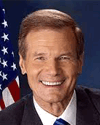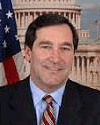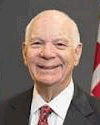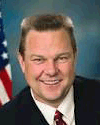• Trump's Communications Strategy Really Is a Mess
• Can Trump Stop the Leaks?
• Russians Discussed "Derogatory" Information about Trump and His Aides
• Dirty-Money Case Could Ensnare Trump
• Rundown of the Senate Races, Part I
Trump's Communications Director Leaves
President Trump's communications director, Mike Dubke, has resigned. He had been on the job only 3 months and gave no reason for leaving. He actually tendered his resignation before Trump left on his overseas trip, but agreed to stay in place until Trump got back.
Dubke's job was to oversee the White House messaging strategy. It is possible Trump has realized that his communications strategy is not very good and he wants to have someone else shape it (though good luck with that; see below). This could be the first of multiple personnel changes. At this point Trump probably realizes he has to do something, and personnel changes are the easiest thing to do. Stopping leaks is the hardest (see below).
CNN's Chris Cillizza notes that while Dubke may not be a household name, his departure matters a lot. To start, he was one of the few Trump administration insiders with ties to the GOP establishment (in particular, to Karl Rove). His hiring was seen as an olive branch to the lions of the Party. Now, the branch has been snapped in half. Similarly, adding Dubke to the team was a rare instance of Trump going outside his comfort zone, and hiring someone who is not already part of his inner circle. Now, Dubke is out, and Trump is ready to bring Corey Lewandowski and David Bossie back on board. In other words, the President is resuming his habit of surrounding himself with yes men and sycophants. That may be good for his ego, but it's bad in terms of avoiding costly mistakes. (V & Z)
Trump's Communications Strategy Really Is a Mess
It is clear that Donald Trump is focused intently on the Russia situation, but that he really has no idea what to do. And so, he's currently in the midst of his "backed into a corner" routine, firing from the hip, as the urge strikes him. This serves to highlight several of the weaknesses in his overall communication strategy.
To start, and perhaps most obviously, there's the total lack of consistency. As we pointed out yesterday, Trump cannot decide if the anonymous sources in the White House are "fake news" to be ignored, or real people who need to be punished. On Tuesday, he managed to find yet another position to adopt, tweeting a link to a story in which an anonymous source says it was the Russians' idea to have a secure communications' channel, and not Jared Kushner's. This is not particularly credible, and at the same time means that Trump has now taken the position(s) that anonymous sources are: (1) good, (2) bad, and (3) nonexistent.
This leads us to a second problem: Trump's low regard for America's collective IQ. Reportedly, H.L. Mencken once said that, "nobody ever went broke underestimating the intelligence of the American public." There may be some useful wisdom there, but it's also possible to take things to extremes. On Monday, the Washington Post's Ashley Parker wrote a story about the "snubs and slights" of working in the Trump White House. In essence, The Donald apparently takes great pleasure in lording his power over his underlings, insulting them at will, and delighting in reminding them that they could be fired at any time. The administration responded by releasing a statement under White House Director of Strategic Communications Hope Hicks' name. It read, in part:
President Trump has a magnetic personality and exudes positive energy, which is infectious to those around him. He has an unparalleled ability to communicate with people, whether he is speaking to a room of three or an arena of 30,000. He has built great relationships throughout his life and treats everyone with respect. He is brilliant with a great sense of humor, and an amazing ability to make people feel special and aspire to be more than even they thought possible.
It is not remotely believable that this is an honest assessment. Hope Hicks might very well enjoy working for Trump, but this reads like an infomercial, one that was likely dictated by the President himself. Nobody who was on the fence about Trump (not that there are many people like that) would be persuaded by this kind of marshmallow fluff. It's reminiscent of the "doctor's" letter that claimed Trump "will be the healthiest individual ever elected to the presidency," and was clearly not written by a doctor.
A third problem is that Trump and his team do not seem to understand that there is a big difference between political liability and legal liability. The Donald has chosen Michael Cohen to lead his defense against the Russia collusion charges. In his first public remarks on the matter, Cohen announced that the whole thing is a "total fishing expedition," a "rush to judgment," and said that, "They have yet to produce one single piece of credible evidence that would corroborate the Russia narrative." This kind of hyperbole is apropos for a criminal defense lawyer, for whom even Charles Manson is an innocent lamb who just happened to be in the wrong place at the wrong time. However, it simply will not get it done politically. If Trump's approach is to deny, deny, deny, as opposed to engaging with the charges against him, then voters will fill in the blanks themselves, and the members of Congress will grow increasingly bold in defying the President. It's worth keeping in mind that it is they, and not a criminal law judge, who will decide whether to impeach Trump.
Fourth, and finally, there's the Twitter issue. The good thing about the social media platform is that it allows Trump to engage with the American people instantaneously and without filters. The bad thing is that it allows Trump to engage with the American people instantaneously and without filters. This means that some of his greatest weaknesses are on full display, including his tendency to speak before thinking, as well as his less-than-stellar command of the language. Trump managed to make himself the butt of jokes once again on Tuesday with this Tweet:
Despite the constant negative press covfefe
— Donald J. Trump (@realDonaldTrump) May 31, 2017
Presumably, 'covfefe' was supposed to be 'coverage,' but whatever the case may be, #covfefe quickly became a meme, with people hoping that it's not the secret code for launching the nukes, or else wondering if Trump sat on his phone. The Twitter account 'Covfefe' was quickly snapped up, as was the domain www.covfefe.com, which has "Make Covfefe Great Again" t-shirts for sale. Somewhere, Gerald Ford is thanking his lucky stars he didn't fall out of that airplane in the Internet Age.
The bottom line is this: These things are not going to change. Trump can dump Mike Dubke, Reince Priebus, Hope Hicks, Sean Spicer, and every other person who has anything to do with the White House's communications strategy, and it won't matter. All of these problems are a product of the man Trump is—a non-politician who goes with his gut, is overly-confident in his own superior intelligence, and doesn't think ahead. His approach got him this far, so it's understandable why he has no plans to abandon it, regardless of the consequences. (Z)
Can Trump Stop the Leaks?
While Donald Trump likes to call news stories he doesn't want out there "fake news," in some cases he knows they are real news, even if he won't admit it. He would most definitely like to stop all the leaks, but that is not so easy to do. Case in point: The day after Trump fired James Comey, he met with Russian Ambassador Sergey Kislyak and Russian Foreign Minister Sergey Lavrov in the Oval Office and the contents of their conversation promptly leaked. How could that happen? There was a government note-taker in the room, who wrote up a memo of what was said. The memo was then given to someone who edited it. Then it was circulated to relevant officials at the State Dept., Defense Dept., CIA, and other agencies. A substantial number of people got to see it, any of whom could have leaked it. And in some cases, assistants and secretaries could have seen the material as well.
There are really only two ways to prevent leaks like this. The first way is not to take and circulate notes, thus leaving the intelligence community in the dark about what the president is doing and saying. The intel pros are not likely to be enchanted with this solution. The other way is to catch a leaker and send that person to jail as a warning. In practice, that is easier said than done. The White House could subpoena the reporter who wrote the story and prosecute him or her for refusing to give the name of the leaker. That is far from a sure bet, though, since the case would ultimately end up in the Supreme Court, years later, with an unpredictable outcome.
And even that might not work. A number of newspapers have set up special channels for leakers to pass information to reporters without revealing who they are. For example, the New York Times uses several methods. If a reporter gets multiple anonymous tips that seem to agree, the story might get printed even though nobody at the paper knows who the leakers are. While Attorney General Jeff Sessions has said that rooting out leaks is a top priority, he will soon discover that that is very tough to do. (V)
Russians Discussed "Derogatory" Information about Trump and His Aides
It's a rare day that there's not some new revelation about the relationship between the Donald Trump campaign and the Russians. Tuesday's news is that, in conversations intercepted by U.S. intelligence, the Russians discussed "derogatory" information that they had collected on Donald Trump and several members of his team.
Such stories always come with the caveat that the Russians sometimes exaggerate or tell baldfaced lies in their "private" conversations, precisely because they know that someone may be listening. With that said, this particular conversation reflects a common practice of theirs—gathering kompromat on those over whom they wish to exert influence. It's unclear exactly what information the Russians might have been referring to, but one very good possibility is that it is financial in nature, possibly even about the Bayrock Group (see below). In any case, the noose just keeps getting tighter. (Z)
Dirty-Money Case Could Ensnare Trump
Switzerland is considering turning two oligarchs who have been involved in money laundering over to Ukraine, which wants to prosecute them. The Trump connection runs through the Bayrock Group, which has numerous business dealings with Trump. The case is extremely complicated, but suffice it to say that part of the money laundering was done by buying expensive condos in Trump-branded luxury properties built by Bayrock but partially owned by Trump.
A key figure in this is Bayrock partner, Felix Sater, who has twice been convicted of crimes, and who is a close associate of Trump. There are also cases pending in the United States. Prosecutors want to know how much Trump and his partners knew about the illegal money laundering and how much they helped with it. If they can convince a California Court to let the case proceed, prosecutors will be able to dig for evidence during the discovery process, and what they find may come very close to Sater and to Trump. (V)
Rundown of the Senate Races, Part I
We are starting to pay attention to the 2018 Senate races, and here is our first take on them. Below are brief descriptions of a dozen of the Democratic-held seats up in 2018 (in alphabetical order by state). More will follow. (Z)
California
| Incumbent | Challenger | Notes Polls |

Dianne Feinstein (D) |

(R) |
Dianne Feinstein will be 84 on Election Day, which is well past retirement age in most professions, but is middle aged in a body where members sometimes linger past the century mark (see Thurmond, Strom). She's given every indication she plans to run for her fifth term, and she will likely get it. The only real threat to Feinstein is a challenge from the left; her generally moderate political positions are not a great match for a state where the Democratic base loathes Donald Trump and is out for blood. Indeed, state party activists have been trying to gently coax the Senator to ride off into the sunset. The good news for Feinstein, assuming she sticks to her guns, is that California is also electing a new governor in 2018. Since Jerry Brown (D) is term limited, that makes his job a much more realistic target for the rising Democratic stars of the state, like Lt. Gov. Gavin Newsom and former Los Angeles mayor Antonio Villaraigosa. As long as Feinstein raises piles of money (she's already pulled in nearly $6 million), and shows no signs of weakness, she's likely to convince the top-tier candidates to leave her alone and to focus on the governor's mansion. Thus far, she has only drawn one Democratic challenger—perennial candidate Douglas Howard Pierce—and no Republican. Given California's jungle primary, it may end up that Feinstein ends up facing a member of her own party on November 6. |
Connecticut
| Incumbent | Challenger | Notes Polls |

Chris Murphy (D) |

(R) |
Nothing to see here. Murphy is popular in his home state, is a leading Trump critic, and won his first Senate election by 11 points. This time, he figures to win re-election by an even larger margin. His Republican opponent last time was self-funding WWE millionaire Linda McMahon. She presumably won't be back, since she is now Administrator of the Small Business Administration for Donald Trump. If the Connecticut GOP can't find more cannon fodder—er, another self-funder—in 2018, they may not even bother fielding a challenger. |
Delaware
| Incumbent | Challenger | Notes Polls |

Tom Carper (D) |

(R) |
Given how many seats the Democrats need to defend in 2018, they are lucky that quite a few of them are safe. Delaware is in that category; the state is very blue, and Carper has a 3-to-1 approve-to-disapprove ratio. He's been earning a lot of attention for his battles with EPA Administrator Scott Pruitt, and appears set to make global warming and the environment the centerpiece of his re-election pitch. The Republican bench in the Diamond State is paper thin, and unless state treasurer Ken Simpler decides to make a run, Carper's opponent—if he ends up with one—will likely be an unknown. |
Florida 
| Incumbent | Challenger | Notes Polls |

Bill Nelson (D) |

(R) |
Nelson enjoys wide approval, has collected nearly $4 million in contributions already, and seems likely to benefit from the national political climate. After all, if the Democrats can make R+10 and R+16 districts competitive thanks to anti-Trump sentiment, then an R+2 state should be a relative cakewalk. However, there is a chance that Nelson will draw a formidable challenger—Gov. Rick Scott (R), who is term-limited, and so will be looking for a job as of January 2019. If Scott enters the race, he has the name recognition and the fundraising ability to make a real contest of it. Until he decides, other possible Republican challengers are keeping their plans to themselves, and the race is in a holding pattern. Likely, Scott—who endorsed Donald Trump—wants to see if The Donald's fortunes rise or fall. If Trump remains enmeshed in scandal and low approval ratings, Scott will likely stay out, since Nelson will paint him as the President's twin brother. If it's not Scott, then Lt. Gov. Carlos López-Cantera—who ran for Marco Rubio's Senate seat before stepping aside due to Rubio's surprise decision to run for re-election—is a strong possibility. López-Cantera would make Nelson sweat a bit, but not as much as Scott would. |
Hawaii
| Incumbent | Challenger | Notes Polls |

Mazie Hirono (D) |

(R) |
Hawaii is the bluest state in the Union, and Hirono has solid approval ratings. The only thing she has to fear is a challenge from the left, and the likeliest candidate to do so—Rep. Tulsi Gabbard (D)—has already opted out of the race. Hirono may not draw a GOP opponent; the Republican in both of Hawaii's last two senate races was John Carroll, a perennial candidate who has also run twice for the governorship of Hawaii and once for the House of Representatives. Though Carroll has served in the state legislature, he last held office in 1980, and will be 86 on Election Day 2018. He presumably won't run again, and if he doesn't, there may not be anyone else who is interested. |
Indiana 
| Incumbent | Challenger | Notes Polls |

Joe Donnelly (D) |

(R) |
This is shaping up to be a tough race for Donnelly. On one hand, he has a good (but not great) approval rating, his fundraising is going well (almost $4 million so far), and he's got the advantages of incumbency. On the other hand, Indiana's a red state that Donald Trump won by 19 points, and Donnelly won his first Senate race only because tea partier Richard Mourdock shared his views on rapes being a part of God's plan. The Republican bench is deep in Indiana, and several prominent members of the Party are weighing runs, though no serious challenger has thrown their hat into the ring yet. The possible contenders are likely waiting to see what happens with the AHCA; few states will be hurt more by an Obamacare repeal, and if the repeal actually goes through, it will make for an ugly campaign for any Republican. Of course, Donnelly is going to make an issue of the AHCA regardless of what happens. Otherwise, though, he's been steering a very centrist course, supporting many of Donald Trump's cabinet nominees, and being one of only three Democrats to vote for SCOTUS nominee Neil Gorsuch. |
Maryland
| Incumbent | Challenger | Notes Polls |

Ben Cardin (D) |

(R) |
If Ben Cardin wants a third term, he can have it. However, he will be 74 on Election Day, and hasn't fully committed to running again. If he were to call it a career, the likeliest replacement is Rep. Elijah Cummings, who is a rising star in the Democratic Party. The Republicans actually have a bench in the Old Line State, starting with Governor Larry Hogan, but no serious GOP challenger has signaled an interest in running as yet. |
Massachusetts
| Incumbent | Challenger | Notes Polls |

Elizabeth Warren (D) |

(R) |
Warren has a huge national profile, is leading the 2018 field in fundraising ($14.6 million), has one of the highest approval ratings in the Senate (64%), and is a leader of the opposition to President Trump. In short, although she took only 54% of the vote in her first Senate election, she's a heavy favorite to win a second term. Massachusetts is not averse to electing Republicans, including Gov. Charles D. Baker and Lt. Gov. Karyn Polito. The problem the GOP is facing is that none of their top-flight candidates wants to run. This being the case, they are stuck with a collection of second-tier options, none of whom is a threat to Warren. |
Michigan 
| Incumbent | Challenger | Notes Polls |

Debbie Stabenow (D) |

(R) |
Debbie Stabenow eked out a victory in her first Senate race, defeating incumbent Spencer Abraham (R) 49.5% to 48%. Since then, she's won by 16 and 21 points, so she's likely to win election a fourth time. That said, her approval ratings are only middling (49%), and Michigan is very purple these days. Republicans have thus targeted Stabenow's seat as a pickup opportunity, and the state GOP is already running a commercial making hay out of the Senator's vote against SCOTUS nominee Neil Gorsuch. There aren't too many places where Donald Trump's successes in the next year, or lack thereof, will matter more. At the moment, given the President's struggles, the GOP is having trouble recruiting a top-flight candidate. Thus far, the only declared Republican is Lena Epstein, a newcomer whose campaign will be financed by her family's oil money. In terms of possible opponents, Reps. Justin Amash and Fred Upton have both been mentioned, as has former Michigan Senate Majority Leader Randy Richardville. And, now that we live in a political world where experience doesn't matter, the names of musicians Ted Nugent and Kid Rock have also been floated. Amash and Upton could pose a serious challenge to Stabenow; the others, not so much. |
Minnesota
| Incumbent | Challenger | Notes Polls |

Amy Klobuchar (D) |

(R) |
Amy Klobuchar is one of the most popular members of the Senate (67% approval), has already banked $4.1 million for her re-election campaign, and won her previous Senate elections by 35 and 21 points. She's going to benefit from the fact that the Minnesota governor's mansion will be open, and so will be a much more attractive target for both aspiring Republicans and Democrats. It may also help her that five different Minnesota house races are expected to be highly competitive; these could suck up most of the political donations and make it hard for a GOP challenger to gain the financial traction that is needed for a Senate run. Indeed, so far only Rep. Erik Paulsen (R) has even admitted to considering it. Add it all up, and it's likely Klobuchar draws a second-tier challenger and then scores another big victory, keeping her 2020 presidential aspirations alive. |
Missouri 
| Incumbent | Challenger | Notes Polls |

Claire McCaskill (D) |

(R) |
Few incumbents face a more daunting challenge in 2018 than Claire McCaskill. Her approval ratings are not far above water (48% approve, 36% disapprove) and Donald Trump won her state by nearly 20 points. She's already the subject of a commercial blitz hammering her for her support of Planned Parenthood, her opposition to the AHCA, and her failure to solve Missouri's opioid-addiction crisis (as if a U.S. Senator somehow has the power to end drug abuse). McCaskill is doing what she can to fight back, though she's got to walk a fine line. For example, she has been put in an odd position by VoteVets, which is running ads touting her pro-veteran voting record. While the Senator is pleased to have that information publicized, VoteVets is a super PAC funded by the sort of "dark money" that McCaskill has opposed, and so the commercials make her look hypocritical. Ergo, she's disavowed the ads, despite their being pro-McCaskill. A long list of Republicans may choose to join the race, from Reps. Sam Graves and Vicky Hartzler to Missouri Attorney General Josh Hawley to former NASCAR driver Carl Edwards. The only Republicans who have actually declared, however, are a pair of unknowns. Until we see what the GOP challenge looks like, it's hard to assess McCaskill's chances. |
Montana 
| Incumbent | Challenger | Notes Polls |

Jon Tester (D) |

(R) |
Montana is a tough state to get a read on. On one hand, Donald Trump won there by 20 points, and Greg Gianforte just claimed a comfortable victory in the race for the state's only Congressional seat despite having beaten up a reporter on the eve of the election. On the other hand, Montana's governor is a Democrat, and Tester has managed to get elected twice (albeit by slim margins). If his opponent was Ryan Zinke, Tester would be sweating right now, but Zinke chose to become Secretary of the Interior instead, and—barring a change of plans—won't be running. Thus far, the only declared Republican is State Senator Albert Olszewski, who would be a big underdog. Former governor and RNC Chair Marc Racicot is rumored to have interest, as is Montana Attorney General Tim Fox. Either of them might make a race of it, but until they or someone else with more stature than Olszewski declares, this seat appears to be fairly safe for the Democrats. |
Email a link to a friend or share:
---The Votemaster and Zenger
May30 Trump Is Consumed by the "Russia Thing"
May30 Trump Should Fire Kushner
May30 Trump Can't Decide How to Deal with the News
May30 Trump Staffer Says that the Portland Attacks are Unacceptable
May30 Can the President Be Indicted?
May30 The CBO Score and Election Year Pain
May30 The Sanders Revolution is Fizzling
May30 Georgia Republican Is Running with Trump and against Trump at the Same Time
May30 Wisconsin Democrats Like Their Chances of Knocking Off Scott Walker
May29 Merkel: United States Is Not a Reliable Partner
May29 Trump Calls Kushner Reports "Fake News"
May29 Intel Pros See No Legitimate Explanation for Kushner Plan
May29 Rosen: Trump No Media Master
May29 Mattis: ISIS Policy Now "Annihilation"
May29 Trump Pressed to Speak Out on Portland Attack
May29 Trump's Budget Got a Chillier Reception than Bush's
May29 Who Is Trump Most Like?
May28 Trump: I Think We Hit a Home Run
May28 Trump Plans to Back Out of Paris Accord
May28 Florida Republican Worked with the Russians
May28 McMaster: I am Not Concerned about a Backchannel with Russia
May28 Follow the Money
May28 Is Trump Stuck?
May28 Bannon May Return to Prominence as "Wartime" Consigliere
May28 Tillerson Will Not Host Ramadan Reception
May25 Former CIA Director Tells House that Russia May Have Recruited Trump Campaign Aides
May25 Did Russia Buy Ads on Facebook during the Election?
May25 Trump Administration May Have Spilled the Beans Again
May25 Trump Tax Plan Contains $2 Trillion Error
May25 Does Trump Have Brain Disease?
May25 CBO Will Release Its Assessment of the AHCA This Afternoon
May25 The Midwest Shifted Sharply toward the Republicans in 2016
May25 At Fox News, No Matter How Much Things Change, They Stay the Same
May25 Texas Adopts New Voter ID Bill
May25 Maine Supreme Court Nixes "Instant Runoff" Voting
May24 Former CIA Director Tells House that Russia May Have Recruited Trump Campaign Aides
May24 Did Russia Buy Ads on Facebook during the Election?
May24 Trump Administration May Have Spilled the Beans Again
May24 Trump Tax Plan Contains $2 Trillion Error
May24 Does Trump Have Brain Disease?
May24 CBO Will Release Its Assessment of the AHCA This Afternoon
May24 The Midwest Shifted Sharply toward the Republicans in 2016
May24 At Fox News, No Matter How Much Things Change, They Stay the Same
May24 Texas Adopts New Voter ID Bill
May24 Maine Supreme Court Nixes "Instant Runoff" Voting
May23 Trump Budget to Drop Today
May23 Flynn Defies Subpoena and Invokes the Fifth Amendment
May23 Mueller Inquiry: The Plot Thickens
May23 Trump Is Working on Picking a Legal Defense Team

